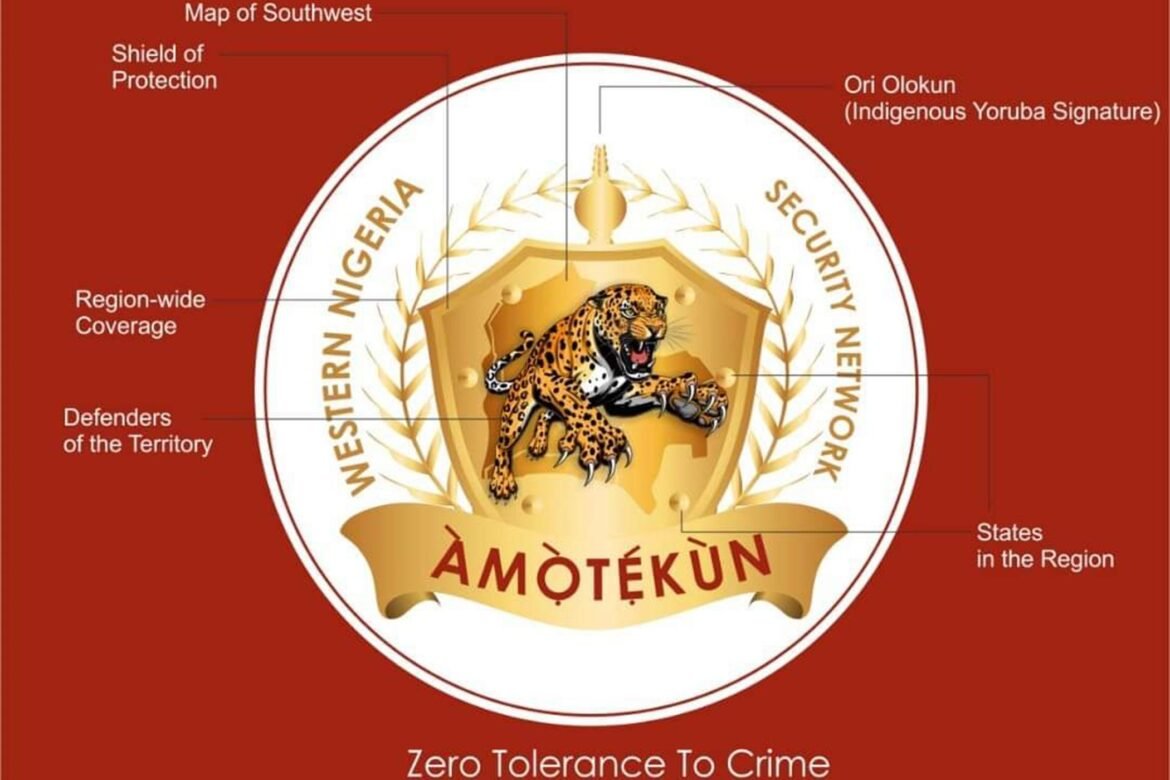There’s a reason why we’re the world’s largest ostrich farm. And that reason was given yet again in legalese in the response of the Attorney-General and Minister of Justice, Abubakar Malami, to Amotekun, the regional security network launched by the six South west states last week.
In nice words that invite the governors to hell, while still making them look forward to the trip, Malami told the six governors comprising one former president of the Nigerian Bar, and another who holds a PhD holder in War Studies, that they failed to do their homework.
If only they had taken a passing glance at the Constitution, they would have seen that under the law, security as it relates to military or paramilitary organisations, is strictly within the ambit of the Federal Government.
With a bit of homework, Malami admonished, the idea of Amotekun (Yoruba for leopard) would not have arisen, in the first place. The frightening security situation in the country is not his headache. His job is to warn the likely infringers on the danger ahead, and if he has to beat the Southwest’s leopards over the head with the law to restrain them, so be it.
It’s hard to find anywhere else where people respond to problems by pretending that the problems don’t exist.
When most people build a house – and some even before they finish – a maiguard is deployed. This is something we all do without asking Malami for approval. We pray and trust in divine protection, but it doesn’t stop us hiring a gateman to keep watch.
The wealthier ones go the extra mile. They not only hire private security, they hire specially trained and armed policemen for round-the-clock personal protection.
It gets even more interesting, if they’re big politicians. They get a bunch of armed policemen to guard their homes and offices, a truckload of armed policemen as outriders as they are chauffeured in bullet-proof cars, and just enough policemen to carry handbags for their wives and do school-runs for their children.
Everyone who can, will go the extra mile to protect themselves. After years of hairsplitting, we have also reluctantly come to accept vigilantes or neighbourhood watch as sensible means of protection where individual resources and police eyes may not reach.
And to do that, no one ever needed to ask Malami or consult the Constitution on how useful an overworked and underpaid police force might be.
The problem, the real game of ostrich, starts when we go beyond individuals and local communities and start discussing states or even regions.
“In Benue State, over 23,000 were displaced across 14 local governments between 2014 and 2016. Between May and June 2019, 65 people were killed in Jalingo, the Taraba State capital, while 9,000 were displaced.”
The ostrich game starts when we begin to ask just what kind of system is required to protect larger swathes of the public who cannot protect themselves from the ever-multiplying franchises of criminals – bandits, herdsmen, kidnappers and all sorts of gangs – who have made both our streets, schools, markets, homes and highways, very unsafe.
The Global Terrorism Index estimated that 1700 persons were killed by herdsmen in 2018 alone. It gets more horrific if you try to look at a state-by-state picture. In a current report, West Africa Insight said, “In Benue State, over 23,000 were displaced across 14 local governments between 2014 and 2016. Between May and June 2019, 65 people were killed in Jalingo, the Taraba State capital, while 9,000 were displaced.”
In Katsina, the state government was forced, only recently, to negotiate with cattle rustlers and bandits to lay down their AK-47 rifles for amnesty.
A report by former Inspector General of Police, Mohammad Abubakar, about banditry in Zamfara, said 6000 lives were lost, 4000 women widowed, and 25,000 children orphaned. According to the report, banditry has grown from petty crime to a N3billion industry, with paramount traditional rulers up and down the state heavily invested.
Kaduna has not been spared. As you read this article policemen are still looking for four seminarians bundled away from their dormitory along the Kaduna-Abuja highway by gun-wielding kidnappers.
From Abia to Sokoto and from Rivers to Zamfara, the country has been gripped by the terror of criminal gangs who, having nearly overwhelmed ordinary citizens, have made no secret of their intention to overwhelm the state and its agencies.
Politicians, who either have themselves been targeted or whose relatives or friends have been victims, obviously recognise the danger.
The irony, however, is that instead of thinking of and pursuing a solution that protects the greatest number, they spend time and resources protecting themselves and their immediate communities, while arguing that it is futile or illegal to pursue regional options for the collective good.
Malami’s response shows that hypocrisy by politicians has reached its adult stage. When it was in its infancy, the argument was that politicians would use regional or state police against their enemies.
It is OK for the Federal Government to use the police – and later the military – to rig elections in areas where the ruling party is weak or for powerful federal agents to deploy the police against their enemies anywhere, but states cannot just be trusted with common sense to use the police for anything good.
“But it’s beyond the governors, and they know. Terrorized and helpless citizens in the region have watched the security situation – fueled by weakened state organs, corruption and demographic factors – get from bad to worse.”
Behind Malami’s legalese is the fear that in light of the renewed threat of Biafra in the South east and the launch of an agenda for the economic integration of the South west last year, Amotekun is a dangerous attempt to get through the backdoor restructuring that has been maliciously deadlocked for years. In short, Amotekun is a slippery slope.
But clarity is not the language of politics which, instead, is governed by shadows and symbolism. When, for example, former military president, General Ibrahim Babangida, said Amotekun was pointless because the state governments would be unable to equip them, he made it sound as if he was not opposed to the idea in itself, only the problem of funding.
He conveniently forgot that had he and other military officers of his generation not played a major role in emasculating the police, the force might have been in a far better position to deal with our current security problems. Supporting Amotekun would be self-betrayal and an open admission of his own failure.
Also, when Malami says a regional security outfit is against the law, he has one eye on the Constitution and the other on his appointor, President Muhammadu Buhari, whose body language is opposed to anything of this kind.
Yet, it would be unfair to suggest that Malami is the only prisoner to Buhari’s body language. Large sections of the political elite in the South west, especially those with political ambition – and that includes the governors behind Amotekun – are scared.
On their own, they won’t lift a finger, much less donate dozens of patrol vans for Amotekun. But it’s beyond the governors, and they know. Terrorized and helpless citizens in the region have watched the security situation – fueled by weakened state organs, corruption and demographic factors – get from bad to worse.
They have seen Kano set up the Hisbah, a religious police force, and nothing happened; Katsina borrowed a leaf from Rivers and Bayelsa and openly negotiated with bandits to turn in their arms, and nothing happened.
Kaduna hired special forces to guard schools, and nothing happened. And Yobe and Borno have a joint patrol force against Boko Haram, and nothing happened. Why should governors elsewhere not be able to jointly look after citizens in their zones?
If the governors of the South west made a mistake with Amotekun, with Inspector General of Police Abubakar Adamu as willing accomplice, then it’s an overdue mistake, vital for the safety and security of citizens in the face of an increasingly impotent federal service.
If over three decades ago, the Native Authorities, which were the smallest units of government, had their own police force, it’s nonsense to resist an attempt by a region of six states to set up a regional security network (not even a police force), 60 years later.
Malami is right about one thing, though: the governors ought to have done their homework. Just like Lagos, they ought to have passed laws in their states legalising their own security service and then Amotekun would be the umbrella service.
Once that is done, they can leave Malami to worry about the leopard.
The Oracle Strikes Back…
If Rev. Father Ejike Mbaka’s Adoration Ground Ministry were a listed company, the stock price would have shot through the roof by now. But the windfall would still come, perhaps in a slightly different way.
After the Supreme Court ordered on Tuesday that Senator Hope Uzodinma of the All Progressives Congress (APC) should replace Emeka Ihedioha of the Peoples Democratic Party (PDP) as Imo governor, as the Oracle prophesied, Mbaka’s stock has risen.
If he calls politicians once, they will answer twice. And writers like me who doubted his prophecy will eat a healthy dose of the humble pie. But what does this mean?
While we digest the judgment of the Supreme Court, delivered by one of the most respected judges on the Bench, Justice Kudirat Kerekere-Ekun, we’ll have to grapple with the conundrum that in an election in which APC had zero state lawmakers even though it was conducted on the same day with the governorship election and in which 69 other parties and candidates took part:
1) only the APC governorship candidate had a different result;
2) the results from the 388 polling units tendered by the APC candidate were not certified by INEC and were rejected on that basis at the Tribunal and on appeal; and,
3) the Supreme Court’s electoral math could create more voters in Imo than were contained in INEC’s accredited voter list.
The fourth has become the first. But how do we stop the court from usurping voters every time?








